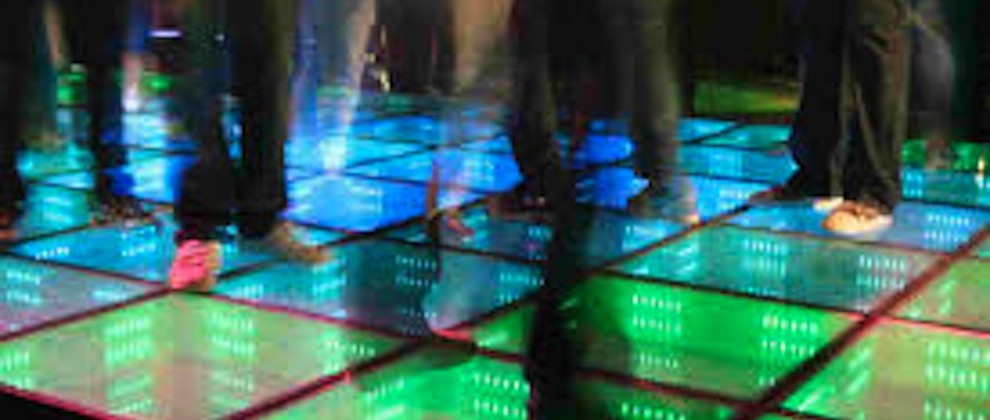* Image from www.sustainabledanceclub.com
Midnight in Rotterdam and the city is exploding into life.
The bikes are stacked four deep outside the opening-night party at nightclub WATT, located between a rain-lashed public park and a fast-food Asian restaurant on a gritty downtown avenue.
A shaven-headed bouncer checks the guest list and twitching teenagers gabble into their mobile phones. Tonight WATT looks the archetypal cool new venue for Rotterdam’s hedonistic clubbers, who power the city’s reputation as the European capital of electronic music.
But, behind the scenes, WATT has another agenda as the trailblazer for the green-clubbing movement.
Run according to sustainable principles, it sets out to reduce energy consumption by 30 per cent, water consumption and waste production by 50 per cent compared to a typical dance venue.
Green power
Earlier that night I have an exclusive preview of the club before the punters arrive.
Entering from the boulevard-style reception, it comprises four main sections: the main hall with capacity for 1500 clubbers, a more intimate, jet-black basement for 300, two relax roofs with chill-out space for smoking (banned this summer in Holland) amongst ferns and plants, and the Lulu Café with 20 covers at street level and an all-day menu.
Green initiatives include a rainwater-flush system for toilets, renewable energy sources and LED lighting, and a zero-waste bar serving organic drinks in recycled plastic cups.
The key feature, however, is the energy-generating dancefloor in the basement, whereby the movement of the dancing clubbers is converted into electricity by an electro-magnetic generator under the floor.
By midnight the club is heaving with a heady cocktail of hardcore clubbers awaiting a set by Paris-based Teenage Bad Girl, a multi-cultural mix of local teenagers attracted by the broad music policy from techno to R ‘n B, and curious locals who remember the club’s former incarnation as a venue for gigs by Underworld and Johnny Cash.
As I hit the dancefloor, busting my best moves in the sweaty basement, the sound of Euro trance pumps from the sound system.
When a MC dressed as a hip-hop nun, rapping the words “Hallelujah” over the beat while two DJs with towering afros deftly work the decks, the gauge at the side of the dancefloor glows green, indicating that the up-for-it crowd on the dancefloor have pushed power levels to maximum.
“I like the idea of a green club but I’m here more for the cool design and great music,” says Rotterdam-based multi-media design student, Tarona Leonora. “I wouldn’t come if it was just a green club.”
“But the way you can make a difference to climate change by coming clubbing here is, well, pretty cool.”
Sustainable living
I first came to Rotterdam when WATT was still a series of architectural drawings.
In rabbit-hutch offices behind a petrol station on the fringe of town, I joined Stef van Dongen, Director of green-entrepreneur consultancy Enviu, to peruse the blueprints for the world’s first venue to use the Sustainable Dance Club (SDC) concept he devised.
He spoke of enlisting clubbers as the foot soldiers of a new sustainability movement that combined youth culture with a commitment to sustainable living.
Things have clearly changed since our last meeting when, the next morning, I head across town to Enviu’s new open-plan offices, the bass-driven thud of deep house still ringing in my ears.
Inside water bottles hang like recycled chandeliers and cartoon-style murals sprawl across the bare walls. In keeping with the company’s green ethos of ‘upcycling’, old water cooler refills have been turned into a recycled filing cabinet.
“Around 130 clubs and festivals, including ones in New York, Cape Town and Sao Paolo, are interested in being direct customers of the SDC project; a larger group have taken the idea but are going it alone in developing the technology,” says Stef as we sip coffee in Enviu’s office, a bevy of young, green-savvy entrepreneurs busily answering phones and preparing presentations around us.
“With the first club now open in Rotterdam we hope to foster competition nature between clubs around the world.”
“When a new and more sustainable club opens, the others all have to play catch up,” adds Stef, whose next project is to send a flotilla of green-fuel hybrid tuk tuks to Indian in early 2009.
Hard cash
Rotterdam Council chipped in €200,000 to WATT’s total €5m cost as part of its affiliation to the Clinton Climate Initiative to accelerate greenhouse gas emissions reductions, while the European Union contributed €450,000 to stimulate cultural events in the city.
But does hard economic reality of running WATT as a business really live up to the pre-launch green hype?
After all, at present the 60m sq dancefloor only generates 300 watts of power – just enough to light up the coloured LEDs set into the floor tiles.
Professor Han Brezet of the Delft University of Technology, who patented and designed the energy-generating dancefloor in collaboration with Enviu, is sanguine.
“The opening of WATT is just a small step and the technology still has a long way to go,” he says. “But I think WATT will make a big difference in the context of changing mindsets.”
“I’m a scientist,” he smiles, “but also an optimist.”
What did you think of this story? Post your comments below.
This article was first published in The Guardian in 2008.
Liked this? Try also A winter warmer at Rotterdam’s best cafe.

